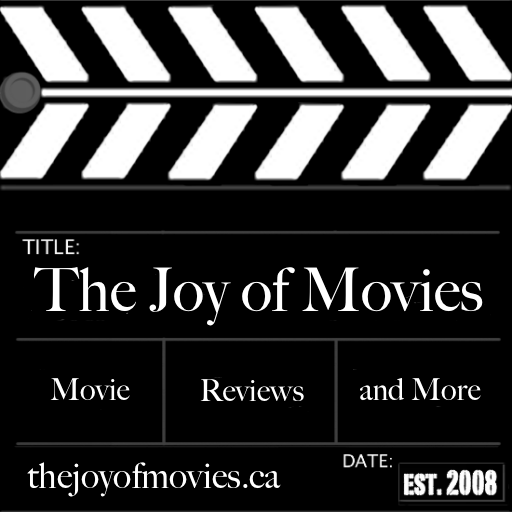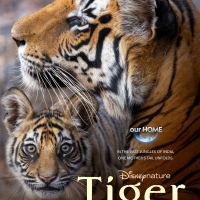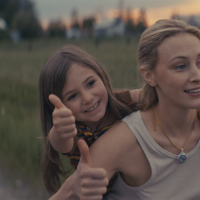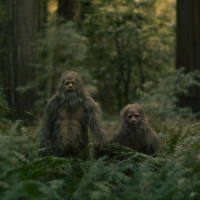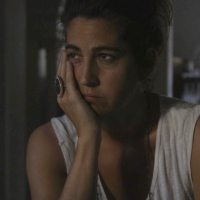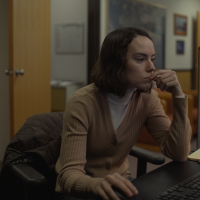Hot Docs Festival Online Reviews
By John Corrado
While the in-person edition of Hot Docs was cancelled this year due to COVID-19, roughly 140 films that were set to screen at the festival will be streamed online instead from May 28th to June 6th, with some being available for even longer. Tickets are $9 apiece, $8 for members, with select screenings featuring pre-recorded Q&As. The screenings are geo-blocked to Ontario, and the full lineup can be found here.
Below are my brief thoughts on seven of these films that I had the chance to screen in advance, arranged in alphabetical order. The seven films that were shown on CBC as part of the Hot Docs At Home series, (which I reviewed over the past several weeks), are also included in the online festival’s lineup, as is the new release The Painter and the Thief, which was incidentally just made available on VOD platforms last week. I have included links to all of those reviews at the bottom.
#BLESSED – ★★★ (out of 4)
How do you get millennials interested in going to church on Sundays? You follow the example of C3, the Australian church franchise that has set up two parishes in Toronto. Run by the charismatic Pastor Sam, a service at the Evangelical Christian church is more like an inspirational rock concert, and the crowd is made up of young people sporting tattoos, skinny jeans and sneakers.
Director Ali Weinstein’s aptly titled documentary #BLESSED follows Pastor Sam and his team as they try to set up a third location in the city to further spread their message, while also introducing us to several young parishioners. Aimee has a history of drug abuse and addiction but was “saved” by the church; David is preparing to go away for a year to Australia on a scholarship to C3 College so that he can become a pastor, having met his girlfriend Mona, with whom he is in a celibate relationship, at the church; and Conan is becoming increasingly involved at C3 despite struggling with his faith and what he believes.
The film also prominently features Galen Watts, a university student who is studying the tactics used by C3 to make religion appealing to young people, and raises some interesting but more troubling questions about how they are using slick marketing techniques to hide less progressive viewpoints on same-sex relationships and other social issues. While the film feels like it is glossing over some stuff, and what is below the surface can be more interesting, #BLESSED still provides a slickly made and mostly engaging look at how younger generations are choosing to worship.
Available until June 14th
Daddy – ★★★ (out of 4)
Brendan Cooney is an American anthropologist who moved to Copenhagen to start a family after falling in love with and marrying a Danish woman. Because he didn’t fluently speak the language, making it hard to find a job, Brendan instead made the choice to stay at home and raise his daughter, while his wife continued going to work, flipping the script on traditional gender roles. After his mother abandoned him as a child, Cooney vowed to never leave his own children, but finds himself tested by the trials and tribulations of parenthood.
Co-directed by Cooney and filmmaker Lars Emil Leonhardt, and shot over the course of six years, Daddy serves as an unfiltered look at fatherhood that shows the joys that come with raising a child, without shying away from the equal number of stressful parts. The film is made up of intimate, professionally shot home video footage, as Cooney provides constant voiceover reflecting on the unique emotions that come with child rearing. At roughly fifty minutes long, Daddy at times seems somewhat slight, but it’s an often charming film that does reach some greater truths about raising children.
Available until June 24th
Dope is Death – ★★★ (out of 4)
In her documentary Dope is Death, Canadian filmmaker Mia Donovan explores the long history of how the use of acupuncture to treat recovering drug addicts was brought to America by radical political groups in the 1970s. The film takes us back to the day in 1970 when the Puerto Rican Young Lords and the Black Panthers staged a well organized occupation of New York’s Lincoln Hospital, taking over Lincoln Detox to better serve their community at a time when minority populations in the South Bronx were being ravaged by heroin addiction.
The clinic was run by Dr. Mutulu Shakur (Tupac’s stepfather), who was trained in the practise by Montreal doctor Mario Wexu, who had studied Eastern medicine. The technique was pioneered as a way to avoid the highly addictive methadone that the Nixon government was pushing to try and deal with drug problems in the community. By inserting acupuncture needles into specific pressure points in the ear, they were able to help addicts get off drugs while avoiding the painful side effects of detox.
Through a mix of interviews and some great archival footage, Dope is Death basically tells two stories; the history of AcuDetox and that of Shakur’s arrest in connection to a deadly bank robbery. While I wish it had gone a bit more in-depth on both, and there are a few loose ends, this is still an interesting film that recounts the fascinating history of this groundbreaking medical practise.
Available until June 24th
First We Eat – ★★★ (out of 4)
In 2015, filmmaker Suzanne Crocker brought the film All the Time in the World to Hot Docs, which documented the nine months that she spent with her husband Gerard Parsons and their three kids living in a wood cabin in the remote wilderness of Canada’s Yukon Territory. Now Crocker returns with First We Eat, a followup of sorts which finds the family attempting a new experiment; to eat only locally sourced food in their community of Dawson City, Yukon for an entire year by hunting, fishing and foraging.
There are challenges that arise, such as trying to find sources of salt and sugar, as well as the question of whether or not they will be able to capture a moose to fill their freezer with meat for the winter. But they are helped by local farmers, getting meat from chickens and pigs that are raised in the community, (be warned that there is some graphic footage of animals being butchered), and produce that is grown in the warmer months or in greenhouses and stored in cold cellars.
I was quite charmed by All the Time in the World five years ago, and one of the most enjoyable aspects of First We Eat is getting to revisit this family. Through this new experiment, Crocker raises a lot of timely questions about food security and sustainability, offering an interesting exploration of how hard it is to eat locally, especially way up North. She proves that it can be done, it just takes a lot of extra time and work.
Available until June 6th
Her Mothers – ★★★ (out of 4)
Virág and Nora are a lesbian couple in Hungary going through the process of adopting a child. While they are eventually successful, and bring home a young daughter, they are faced with an increasingly polarized political climate as Prime Minister Viktor Orbán threatens to strip away rights from same-sex couples, forcing them to grapple with whether to stay in the country, or move elsewhere for the safety of their family.
On the home front, Virág bonds with the child and adjusts well to her new role as mother, but Nora struggles to find her place as the second mother, facing rejection from their daughter. The fact that their daughter is of Roma origin will add another barrier for her when she enters school. Directors Asia Dér and Sára Haragonics gain intimate access to the family in Her Mothers, a low-key documentary that works as both an interesting study of the challenges of motherhood in a non-traditional family unit, as well as a personal, humanizing look at the impact that anti-LGBTQ policies have on people’s lives.
Available until June 24th
Softie – ★★★ (out of 4)
Boniface Mwangi is a photographer and grassroots political activist in Kenya who sets out to win an MP seat in an upcoming regional election. Growing up poor and with a single mother, Mwangi gained the nickname “Softie” as a child, and is hoping to overcome deep-rooted tribalism and widespread political corruption by becoming an elected official.
But there are unique challenges that come with trying to fairly win an election in what is one of the most corrupt countries in the world, where the voters don’t trust politicians and fully expect to be bought, (people mob his campaign van at one point hoping for free t-shirts, and lineups start in the wee hours of the morning on election day with voters hoping for bribes), and Mwangi is also going up against a wildly popular opponent in the form of a local musician named Jaguar.
Directed by Sam Soko, Softie offers an on the ground look at his campaign that shows how hard it is for a grassroots idealist to actually break through and change the system. One of the most interesting aspects of Soko’s film is seeing the effect that Mwangi’s campaign has on his wife Njeri and their three kids, who come to fear for his safety as he faces death threats and comes to terms with potentially giving up his life to help save his country.
Available until June 24th
There’s No Place Like This Place, Anyplace – ★★★½ (out of 4)
Honest Ed’s, the bargain shop at Bloor and Bathurst that Ed Mirvish opened in 1948 and ran for almost sixty years until his death in 2007, was a cultural institution in Toronto. It was a place for the city’s working class to get groceries and other basic needs, with many immigrants using it as an unofficial landing spot when they first came to the city. In 2013, David Mirvish, who acquired the property after his father’s death, sold it to Westbank, a luxury condo developer from Vancouver, and on December 31st, 2016 the store closed its doors for the last time. I was there. I went on the final day.
Filmmaker Lulu Wei memorializes Honest Ed’s in her lovely documentary There’s No Place Like This Place, Anyplace, which focuses on the legacy of the store and the nearby Mirvish Village. Wei has a personal connection to the area, having lived on the same block as Honest Ed’s in an apartment that happened to be the first one that she shared with her girlfriend Kathleen, who is an equal presence in the film. The film explores themes of gentrification, the need for affordable housing in the downtown core, and how much is lost in the name of “progress.”
Watching the film, and the heartbreaking footage spread throughout of the building being ripped apart, I couldn’t help but feel like we as a city are going to look back in many years and wonder what the heck we did by tearing down this landmark. The film made me sad and mournful, both for the loss of Honest Ed’s, and for the fact that I wasn’t able to experience it for the first time with a Toronto audience down the street from where the store used to be at the Hot Docs Ted Rogers Cinema, which would have been the perfect place for its premiere. This is a beautifully crafted and bittersweet love letter to Honest Ed’s and a rapidly changing city that will never be the same.
Available until June 10th
More Reviews:
Made You Look: A True Story About Fake Art – ★★½ (out of 4)
9/11 Kids – ★★★½ (out of 4)
Finding Sally – ★★★ (out of 4)
Meat the Future – ★★★ (out of 4)
They Call Me Dr. Miami – ★★★½ (out of 4)
Influence – ★★★ (out of 4)
The Walrus and the Whistleblower – ★★★½ (out of 4)
The Painter and the Thief – ★★★½ (out of 4)







